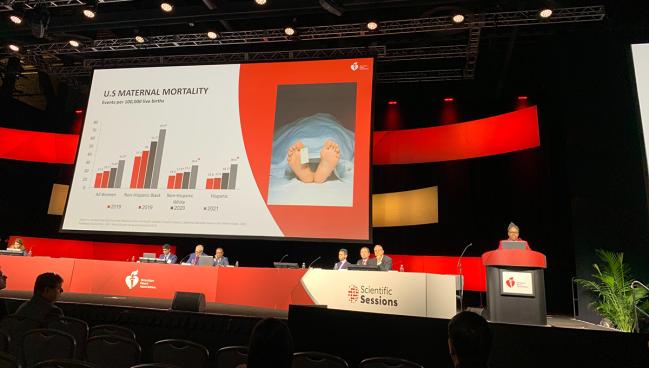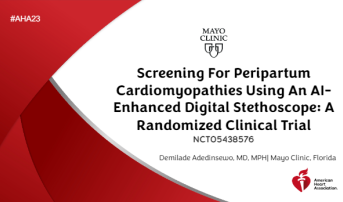AI Improves Detection of Cardiomyopathy in Pregnancy
The AI-guided stethoscope doubled the ability to diagnose low ejection fraction in Nigeria, where maternal mortality is high.

PHILADELPHIA, PA—A screening program that incorporates artificial intelligence (AI) guidance with a digital stethoscope can double the ability to detect peripartum cardiomyopathy, according to the results of the Nigerian SPEC-AI trial.
“This study is the first large clinical trial evaluating an artificial intelligence intervention in pregnancy,” said Demilade A. Adedinsewo, MD, MPH (Mayo Clinic, Jacksonville, FL), speaking with media here at the American Heart Association (AHA) 2023 Scientific Sessions. “It’s battery operated and is portable, so it can be used in different clinical settings and nonclinical settings.”
Approximately 70% of all maternal mortality is concentrated in sub-Saharan Africa, with Nigeria having the highest overall rate worldwide. The country also has highest rate of peripartum cardiomyopathy, at about one in 96 pregnancies compared with one in 1,000 to 4,000 pregnancies in the United States. Even in Western countries, particularly the US, maternal mortality has been trending upward. As Adedinsewo noted, non-Hispanic Black women are disproportionately affected by maternal death, with a threefold higher risk compared with white women.
For the SPEC-AI trial, Adedinsewo and colleagues used a commercially-available digital stethoscope (Eko Health) capable of taking a single-lead EKG and a phonocardiogram. The embedded AI technology predicted the likelihood of left ventricular systolic dysfunction, displaying the results in real time on a phone or tablet.
“This intervention has the potential to improve quality of obstetric care by reducing delays in the diagnosis of a life-threatening, but treatable condition,” Adedinsewo said in her presentation.
According to Alexander Sandhu, MD (Stanford University, CA), portable, scalable AI tools that can solve health problems like this one are greatly needed.
“I think this is a phenomenal example of that,” he said in the AHA press conference, adding that the study clarifies the huge burden of maternal disease in certain populations. He remarked that he found it “startling” that 4% of otherwise healthy young pregnant women in the intervention arm had reduced ejection fraction, which “speaks to how important improving our diagnosis in this space is.”
SPEC-AI
In the all-Nigerian cohort, 1,232 women (mean age 31 years; 100% Black) who were pregnant or had delivered within the previous 12 months were enrolled between August 2022 and September 2023 at six teaching hospitals.
Those randomized to the intervention group received an ECG plus the AI-guided cardiomyopathy prediction, while those in the control group received usual care plus an ECG. Adedinsewo said both groups received ECG to validate the stethoscope in an all-Black, out-of-US population since it was developed and validated in largely white patients in the US.
The primary endpoint of detection of LV systolic dysfunction (< 50%) on echocardiography occurred in 4.1% of the intervention group and 1.8% of the control group (OR 2.3; 95% CI 1.1-4.8). The results were similar across all subgroups, including by region, age, and pregnancy status at entry.
Compared with the control group, the AI-guided screening group had a higher rate of cardiomyopathy diagnosis at an LVEF < 50% (OR 2.05; 95% CI 1.03-4.32). Overall, the digital stethoscope had an area under the curve of 0.93 (95% CI 0.88-0.99) for detection of LVEF < 50% and 0.98 for detection of LVEF < 40% (95% CI 0.97-1.00). It had a sensitivity of 92% and a specificity of 80%.
Who Needs Screening?
Discussant Marco Perez, MD (Stanford University Hospital, CA), after Adedinsewo’s presentation, said the study raises the question of who this type of screening benefits most. “Clearly, I think Nigeria needs a screening program, but the question is what screening program should be implemented?” he said.
Perez also noted that the incredibly high rates of peripartum cardiomyopathy in Nigeria suggest that genetic studies are needed to understand why it is so much more prevalent there than in other parts of the world.
To TCTMD, Adedinsewo said the AI-guided stethoscope could broaden opportunities for screening in a variety of resource-limited settings. However, while the stethoscope currently exists and can be purchased, the algorithm that uses the AI technology was created for the study and is not currently embedded in the devices, she added.
“Right now it’s just marketed as a device that can record an electrocardiogram as well as a phonocardiogram without the AI component,” Adedinsewo said. “It’s designed for any healthcare professional—a nurse, anyone who can use a stethoscope to auscultate can easily use the device.”
L.A. McKeown is a Senior Medical Journalist for TCTMD, the Section Editor of CV Team Forum, and Senior Medical…
Read Full BioSources
Adedinsewo DA. Screening for peripartum cardiomyopathies using an artificial intelligence enhanced digital stethoscope: a randomized clinical trial. Presented at: AHA 2023. November 13, 2023. Philadelphia, PA.
Disclosures
- Adedinsewo reports no relevant conflicts of interest.






Comments